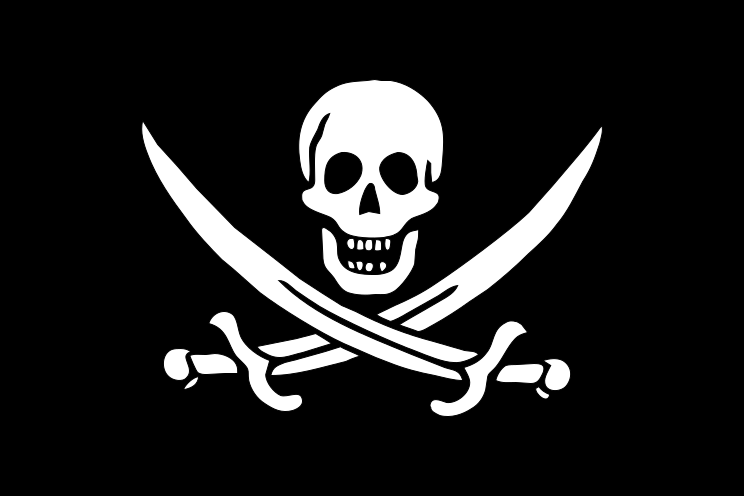PIRATES FIRE ON TANKER OFF OF SOMALIA
 |
| Pirate Flag of Jack Rackham aka "Calico Jack" (1682 to 1720) (PD) |
According to a report by the International Maritime Bureau Pirates attacked a tanker off of Salalah on January 17, 2014. the IMB did not publish the name of the tanker, flag state or owner. What we found interesting about yet another pirate attack by Somalis is that the pirates fired first before even attempting to board. What was also interesting is that the pirates picked a vessel with an armed security detachment which returned fire. Fortunately for all concerned upon return of fire the pirates broke off the attack and departed the area. So much for the official version. Clearly a bunch of pirates in a skiff attempting to take out a large tanker with trained and armed security has bitten off more than it can chew. The attacking force is in an open boat bunched together and the defending force is spread about a giant ship with lots of good mild steel to hid behind and fire from. It seems a fair assumption that professional security personnel actually know how to hit what they aim at. That any pirates survived clearly indicates that a use of force policy is in effect for armed ship's security that must involve warning shots. Fortunately the pirates "rules of engagement must wisely call for abandoning the attack when armed security manifests itself. Very bloodless but does it deter piracy?
We are not for unnecessary blood shed but if an assailing small craft opens fire on a ship with armed security we think there is nothing immoral or illegal about immediately opening fire on the boat with the intention of keeping up fire until the boat clearly stops pursuit. Yes, it is more probable than not that pirates will be killed but the intention is to stop the pursuit and firefight as quickly as possible and before the pirates can spot the positions of the security force. The longer the pirates continue firing the more the chances that crewmen will be injured or killed. There is also no moral or legal imperative to stop and render aid to the pirates after they have been raked with fire. Such an act renders the ship vulnerable to further attack. These skiffs operate from mother ships and the mother ship will be along shortly, the attacked merchant man had best clear the area immediately.
That's not to say there aren't complications possible. With dead pirates in a recoverable position there is always the possibility that the bodies will be produced before some court in the region all too willing to believe that the merchant men wantonly murdered local "fishermen". Nations that allow their commercial ships to employ armed guards had better be prepared to evacuate and replace the ships compliment when pirate deaths occur. Get those officers, crewmen, and security force personnel back to the flag state immediately and refuse to extradite. Why must the commercial crews assume all of the risk. When someone fires on a ship they are opening deadly fire on all aboard. Action to repel attack should not rely on the attackers rules of engagement but should be swift , sure and effective. It does seem an escalation in violence but the total pirate population is reduced, pirate recruitment is dealt a big deterrent blow. Escalation might include larger , faster, armored pirate vessels but that raises pirate over head without raising profits, especially if the shipping companies ratchet up the security forces in response. We think the spike in violence would be temporary and that piracy would be eliminated sooner rather than later. There have been only a handful of deaths at the hands of the pirates, they seem more interested in ransom. But why should we preserve criminal life at the cost of innocent life. If five dozen pirates a year have to be killed in the act to preserve a single innocent life from being lost to the pirates we shouldn't be wringing our hands over it.
No comments:
Post a Comment